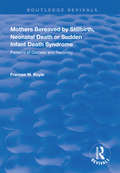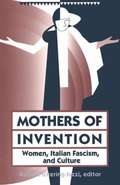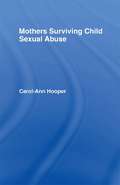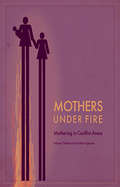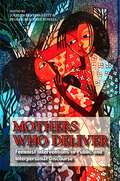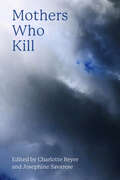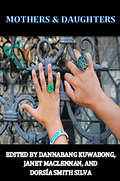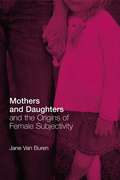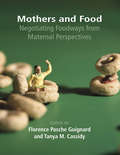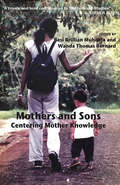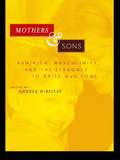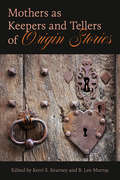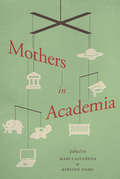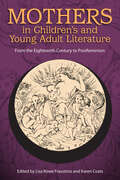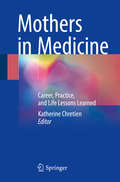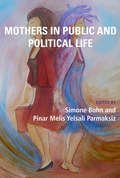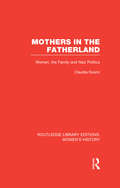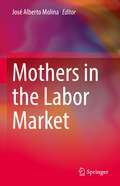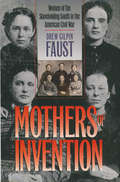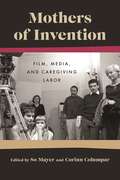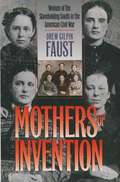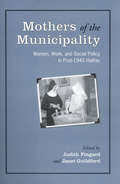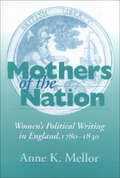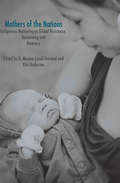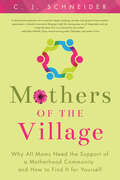- Table View
- List View
Mothers Bereaved by Stillbirth, Neonatal Death or Sudden Infant Death Syndrome: Patterns of Distress and Recovery (Routledge Revivals)
by Frances M. BoyleFirst published in 1997, this volume studied families bereaved by perinatal or infant death, including factors both preceding and following the experience and its effect on areas such as marriage, mental health and future conception, based on interviews with 194 women living in south-eastern Queensland, Australia. Tracing the natural history of the first thirty months of their loss, all mothers completed semi-structured interviews and standardized questionnaires at two, eight, fifteen and thirty months following the baby’s death. The study aims to explain and explore these effects and to suggest some potential recommendations for the care and support of women who experience stillbirth, neonatal death or SIDS.
Mothers Of Invention: Women, Italian Fascism, And Culture
by Robin Pickering-IazziMothers Of Invention: Women, Italian Fascism, And Culture
Mothers Surviving Child Sexual Abuse
by Carol-Ann HooperDespite increased recognition of the high incidence of child sexual abuse, little attention has so far been paid to the women on whom children primarily depend for care adn protection - their mothers. Informed by theory and research on other situations involving loss, secrecy and moral dilemmas, as well as the rapidly accumulating knowledge of child sexual abuse, Mothers Surviving Child Sexual Abuse offers a new analysis of mother's reactions and resposes, presenting a fresh perspective on a shocking porblem for practitioners and policy-makers involved in child protection, as well as students and lecturers of social work and social studies and women's studies.
Mothers Under Fire: Mothering In Conflict Areas
by Tatjana Takseva“Mothers Under Fire: Mothering in Conflict Areas” examines the experiences of women mothering in conflict areas. The aim of this collection is to engage with the nature and meaning of motherhood and mothering during times of war and/or in zones experiencing the threat of war. The essays in the collection reflect diverse disciplinary perspectives through which scholars and field practitioners reveal how conflict shapes mothering practices. One of the unique contributions of the collection is that it highlights not only the particular difficulties mothers face in various geographic locations where conflict has been prevalent, but also the ways in which mothers display agency to challenge and negotiate the circumstances that oppress them. The collection raises awareness of the needs of women and children in areas affected by military and/or political violence worldwide, and provides a basis for developing multiple policy frameworks aimed at improving existing systems of support in local contexts. —Kristen P. Williams, Clark University
Mothers Who Deliver: Feminist Interventions in Public and Interpersonal Discourse (SUNY series in Feminist Criticism and Theory)
by Pegeen Reichert Powell Jocelyn Fenton StittMothers Who Deliver: Feminist Interventions in Public and Interpersonal Discourse brings together essays that focus on mothering as an intelligent practice, deliberately reinvented and rearticulated by mothers themselves. The contributors to this watershed volume focus on subjects ranging from mothers in children's picture books and mothers writing blogs to global maternal activism and mothers raising gay sons. Distinguishing itself from much writing about motherhood today, Mothers Who Deliver focuses on forward-looking arguments and new forms of knowledge about the practice of mothering instead of remaining solely within the realm of critique. Together, the essays create a compelling argument about the possibilities of empowered mothering.
Mothers Who Kill
by Charlotte BeyerThis compelling and unique collection of critical and creative work assesses for the first time cultural, literary, legal and historical representations and narratives about mothers who kill and filicide. The idea of a mother killing her child to many presents the greatest taboo, and the most disturbing and distressing aspect of maternal experience. In Toni Morrison's 1987 novel Beloved, escaped slave mother Sethe addresses her daughter Beloved whom she murdered out of desperation, in order to avoid her returning to a life of slavery and sexual abuse. Sethe reflects, “I'll explain to her, even though I don't have to. Why I did it. How if I hadn't killed her she would have died and that is something I could not bear to happen to her. When I explain it she'll understand.” This book goes beyond Morrison's widely known literary portrayal, in order to investigate a range of other, less known but no less challenging, examinations of maternal filicide. Have mothers who kill inevitably been portrayed as monsters in cultural representations? Or are there certain contexts that may urge us to reevaluate maternal behavior? And how might we counter the misogynist narratives surrounding maternal filicide which have governed literary and historical accounts and affected legal discourses? This wide-ranging and innovative volume examines the complex issues of infanticide and mothers who kill from a broad, interdisciplinary perspective, in order to counter the misogynist cultural narratives that underpin prevailing stereotypes of mothers. The book includes creative work, essays on crime fiction, literature from across a range of historical periods, multicultural and Global South perspectives, legal and historical accounts, and more. Making an invaluable contribution to motherhood studies and gender criticism, this book offers a rich insight into current and cutting-edge research into this most troubling area of maternal representation.
Mothers and Daughters
by Dannabang KuwabongMothers and Daughters is a compelling anthology that explores the multifaceted connections between mothers and daughters. Chapters explore new fields of inquiry, examining discourses about mothers and daughters through academic essays, narrative, and creative work. By examining the experiences of mothers and daughters from within an interdisciplinary framework, which includes cultural, biological, socio-political, relational and historical perspectives, the text surveys multiple approaches to understanding the mother-daughter dynamic. Therefore, the uniqueness and strength of this collection comes from blending not just work from across academic disciplines, but also the forms in which this work is presented: academic inquiry and critique as well as creative and narrative explorations. The length is 296 pages.
Mothers and Daughters and the Origins of Female Subjectivity
by Jane Van BurenMothers and Daughters and the Origins of Female Subjectivity challenges the theory of the Oedipus complex, which permeates psychoanalytic theory, psychology, semiotics and cultural studies. The book focuses on the re-examination of women’s development through the theories of primitive mental states. Women’s subjectivity has been profoundly limited by continuing anxieties about the mother’s body. Jane Van Buren describes how women are gradually escaping the curse of inferiority and finding a voice, enabling the mother to provide their daughters with a legacy of rightful agency over their bodies and minds. Drawing on the theories of Klein, Bion and Winnicott, and incorporating recent developments in psychobiology, this book provides a novel approach to subjects including the dreams, myths and phantasies of individuals, the nature of mother and daughter relationships, sexuality, pregnancy, menstruation and the idea of the mother’s body as problematic and dangerous. This interdisciplinary investigation into curtailed female subjectivity and its many ramifications in society, culture and individual mental growth will be of great interest to all practising psychoanalysts, and those studying psychoanalytic theory and gender studies.
Mothers and Food: Negotiating Foodways From Maternal Perspectives
by Pasche Florence GuignardFrom multidisciplinary perspectives, this volume explores the roles mothers play in the producing, purchasing, preparing and serving of food to their own families and to their communities in a variety of contexts. By examining cultural representations of the relationships between feeding and parenting in diverse media and situations, these contributions highlight the tensions in which mothers get entangled. They show mothers’ agency — or lack thereof — in negotiating the environmental, material, and economic reality of their feeding care work while upholding other ideals of taste, nutrition, health and fitness shaped by cultural norms. The contributors to Mothers and Food go beyond the normative discourses of health and nutrition experts and beyond the idealistic images that are part of marketing strategies. They explore what really drives mothers to maintain or change their family’s foodways, for better or for worse, paying a particular attention to how this shapes their maternal identity. Questioning the motto according to which “people are what they eat,” the chapters in this volume show that mothers cannot be categorized simply by how they feed themselves and their family.
Mothers and Sons: Centering Mother Knowledge
by Brillian Besi MuhomjaMothers and Sons: Centering Mother Knowledge makes a case for the need to de-gender the framing and study of parental legacy. The actualization of an entire collection on this dyad foregrounding motherhood without particularizing the absence of fatherhood is in itself revolutionary. This assemblage of analytical, narrative and creative renderings offers cross-disciplinary conceptualizations of maternal experiences across difference and mothering sons at intersections. The authors’ mother knowledge, or that of their subjects, delivers new insights into the appellations mother, son, motherhood and sonhood.
Mothers and Sons: Feminism, Masculinity, and the Struggle to Raise Our Sons
by Andrea O'ReillyFirst published in 2001. Routledge is an imprint of Taylor & Francis, an informa company.
Mothers as Keepers and Tellers of Origin Stories
by Kerri S. KearneyThis collection presents diverse critical perspectives and discussion about the keeping or telling of children’s originstories as a part of contemporary mothering labor. The first two sections outline perspectives from mother authors about how they strategically craft complex origin stories for their child(ren), as well as how the telling and retelling of origin stories may be passed on as generational knowledge. The third section discusses mothering and origin stories from multiple perspectives: that of a father by adoption, of single mothers positioning stories of absent fathers, and a multi-perspective chapter that includes a mother by adoption, her adult child, and her child’s birthmother.
Mothers in Academia
by Kirsten Isgro Mari CastanedaFeaturing forthright testimonials by women who are or have been mothers as undergraduates, graduate students, academic staff, administrators, and professors, Mothers in Academia intimately portrays the experiences of women at various stages of motherhood while theoretically and empirically considering the conditions of working motherhood as academic life has become more laborious. As higher learning institutions have moved toward more corporate-based models of teaching, immense structural and cultural changes have transformed women's academic lives and, by extension, their families. Hoping to push reform as well as build recognition and a sense of community, this collection offers several potential solutions for integrating female scholars more wholly into academic life. Essays also reveal the often stark differences between women's encounters with the academy and the disparities among various ranks of women working in academia. Contributors—including many women of color—call attention to tokenism, scarce valuable networks, and the persistent burden to prove academic credentials. They also explore gendered parenting within the contexts of colonialism, racism, sexism, ethnocentrism, ageism, and heterosexism.
Mothers in Children's and Young Adult Literature: From the Eighteenth Century to Postfeminism (Children's Literature Association Series)
by Lisa Rowe Fraustino and Karen CoatsWinner of the Children’s Literature Association’s 2018 Edited Book AwardContributions by Robin Calland, Lauren Causey, Karen Coats, Sara K. Day, Lisa Rowe Fraustino, Dorina K. Lazo Gilmore, Anna Katrina Gutierrez, Adrienne Kertzer, Kouen Kim, Alexandra Kotanko, Jennifer Mitchell, Mary Jeanette Moran, Julie Pfeiffer, and Donelle RuweLiving or dead, present or absent, sadly dysfunctional or merrily adequate, the figure of the mother bears enormous freight across a child's emotional and intellectual life. Given the vital role literary mothers play in books for young readers, it is remarkable how little scholarly attention has been paid to the representation of mothers outside of fairy tales and beyond studies of gender stereotypes. This collection of thirteen essays begins to fill a critical gap by bringing together a range of theoretical perspectives by a rich mix of senior scholars and new voices.Following an introduction in which the coeditors describe key trends in interdisciplinary scholarship, the book's first section focuses on the pedagogical roots of maternal influence in early children's literature. The next section explores the shifting cultural perspectives and subjectivities of the twentieth century. The third section examines the interplay of fantasy, reality, and the ethical dimensions of literary mothers. The collection ends with readings of postfeminist motherhood, from contemporary realism to dystopian fantasy.The range of critical approaches in this volume will provide multiple inroads for scholars to investigate richer readings of mothers in children's and young adult literature.
Mothers in Medicine: Career, Practice, And Life Lessons Learned
by Katherine ChretienWomen are entering medical school in equal numbers as men, yet still face unique challenges in a profession where, overall, male physicians outnumber female physicians 3 to 1. Women in medicine also face decisions such as when to have a child during training and often struggle with work-life balance. This book features real stories and advice from mothers in medicine at all stages of training from medical student to practicing physician and addresses the topics that shape the lives, joys, and challenges of women in medicine today. The book is based on the best posts and wisdom shared on the Mothers in Medicine blog, which was established in 2008 by the editor and has published over 1500 posts and has over 4. 8 million page views to date. The book is organized by themes that are unique to the physician-mother: career decisions, having children during training, navigating life challenges, practice issues, and work-life balance. Each chapter features an excerpt from the blog followed by an honest discussion of the key considerations, guidelines, and tips as related to each topic in the conversational, personal tone of the blog. The book concludes with a chapter that features the most popular questions posted on the Mothers in Medicine blog and a summary of the responses received from the community of readers. Mothers in Medicine: Career, Practice, and Life Lessons Learned is a valuable and contemporary resource for pre-medical students, medical students, residents, and physicians.
Mothers in Public and Political Life
by Simone BohnEven though in most nations women are at least almost half of the population, in very few countries do they occupy a similar space in the formal institutions of political power. They are said to lack a key element for a successful career in public life: time. From this perspective, no one is worse off than women who are mothers. From another perspective, however, motherhood is thought to help politicize women, as this life-changing experience makes them aware of the limitations of some specific public policies (such as child-care, parental leave, gendered labor practices etc.) as well as more conscious of the centrality of more encompassing public policies, such as education, health care, and social assistance. This book explores the challenges, obstacles, opportunities and experiences of mothers who take part in political and/or public life.
Mothers in the Fatherland: Women, the Family and Nazi Politics (Routledge Library Editions: Women's History)
by Claudia KoonzFrom extensive research, including a remarkable interview with the unrepentant chief of Hitler’s Women’s Bureau, this book traces the roles played by women – as followers, victims and resisters – in the rise of Nazism. Originally publishing in 1987, it is an important contribution to the understanding of women’s status, culpability, resistance and victimisation at all levels of German society, and a record of astonishing ironies and paradoxical morality, of compromise and courage, of submission and survival.
Mothers in the Labor Market
by José Alberto MolinaThis book describes the social and economic issues that emerge from mothers in labor markets. It provides insight in what the quantitative effect of motherhood on the decline in mothers’ earnings is, and how things differ for mothers with lower income and lower levels of education. It also sheds light on how this effect varies for different countries and/or cultural areas, and what the impact of socio-economic policies on mothers’ labor supply is and how it changes in different family contexts. The book covers topics such as labor participation and hours of work, paid-work and home production, flexibility and work from home, self-employment and entrepreneurship, fertility and maternity leave, wage-penalty and career interruption, labor supply and childcare, gender norms and cultural issues, intra-household wage inequality and much more. This book provides an interesting read to economists, social scientists, policy makers and HR managers and all those interested in the subject.
Mothers of Invention
by Drew Gilpin FaustWhen Confederate men marched off to battle, southern women struggled with the new responsibilities of directing farms and plantations, providing for families, and supervising increasingly restive slaves. Drew Faust offers a compelling picture of the more than half-million women who belonged to the slaveholding families of the Confederacy during this period of acute crisis, when every part of these women's lives became vexed and uncertain.
Mothers of Invention: Film, Media, and Caregiving Labor (Contemporary Approaches to Film and Media Series)
by Rashna Wadia Richards Claire Perkins Missy Molloy Sara Saljoughi Jules Arita Koostachin Kristi McKim Elinor Cleghorn Susan Berridge Maria Cabrera Corinn Columpar Tamsyn Dent Kristy Guevara-Flanagan Alice Haylett Bryan Irene Lusztig So Mayer Tessa Ashlin Nunn Elissa RashkinMothers of Invention: Film, Media, and Caregiving Laborconstructs a feminist genealogy that foregrounds the relationship between acts of production on the one hand and reproduction on the other. In this interdisciplinary collection, editors So Mayer and Corinn Columpar bring together film and media studies with parenting studies to stake out a field, or at least a conversation, that is thick with historical and theoretical dimension and invested in cultural and methodological plurality. In four sections and sixteen contributions, the manuscript reflects on how caregiving shapes the work of filmmakers, how parenting is portrayed on screen, and how media contributes to radical new forms of care and expansive definitions of mothering. Featuring an exciting array of approaches—including textual analysis, industry studies, ethnographic research, production histories, and personal reflection—Mothers of Invention is a multifaceted collection of feminist work that draws on the methods of both the humanities and the social sciences, as well as the insights borne of both scholarship and lived experience. Grounding this inquiry is analysis of a broad range of texts with global reach—from the films Bashu, The Little Stranger (Bahram Beyzai, 1989), Prevenge (Alice Lowe, 2016), and A Deal with the Universe (Jason Barker, 2018) to the television series Top of the Lake (2013–2017) and Jane the Virgin (2014–2019), among others—as well as discussion of the creative practices, be they related to production, pedagogy, curation, or critique, employed by a wide variety of film and media artists and/or scholars. Mothers of Invention demonstrates how the discourse of parenting and caregiving allows the discipline to expand its discursive frameworks to address, and redress, current theoretical, political, and social debates about the interlinked futures of work and the world. This collection belongs on the bookshelves of students and scholars of cinema and media studies, feminist and queer media studies, labor studies, filmmaking and production, and cultural studies.
Mothers of Invention: Women of the Slaveholding South in the American Civil War
by Drew Gilpin FaustExploring privileged Confederate women's wartime experiences, this book chronicles the clash of the old and the new within a group that was at once the beneficiary and the victim of the social order of the Old South.
Mothers of the Municipality
by Janet Guildford Judith FingardHighlighting women's activism in Halifax after the Second World War, Mothers of the Municipality is a tightly focused collection of essays on social policy affecting women. The contributors ? feminist scholars in history, social work, and nursing ? examine women's experiences and activism, including those of African Nova Scotian 'day's workers,' Sisters of Charity, St. John Ambulance Brigades, 'Voices' for peace, and social welfare bureaucrats.The volume underscores the fact that the 1950s and 60s were not simply years of quiet conservatism, born-again domesticity, and consumption. Indeed, the period was marked by profound and rapid change for women. Despite their almost total exclusion from the formal political arena, which extended into the tumultuous 1970s, women in Halifax were instrumental in creating and reforming programs and services, often amid controversy. Mothers of the Municipality explores women's activism and the provision of services at the community level. If the adage "think globally; act locally" has any application in modern history, it is with the women who fought many of the battles in the larger war for social justice.
Mothers of the Nation: Women's Political Writing in England, 1780–1830
by Anne K. MellorA survey of British women’s writings of the late eighteenth and early nineteenth centuries, and the revolutionary New Woman they promoted.British women writers were enormously influential in the creation of public opinion and political ideology during the years from 1780 to 1830. Anne Mellor demonstrates the many ways in which they attempted to shape British public policy and cultural behavior in the areas of religious and governmental reform, education, philanthropy, and patterns of consumption. She argues that the theoretical paradigm of the “doctrine of the separate spheres” may no longer be valid. According to this view, British society was divided into distinctly differentiated and gendered spheres of public versus private activities in the eighteenth and nineteenth centuries,Surveying all the genres of literature?drama, poetry, fiction, non-fiction prose, and literary criticism?Mellor shows how women writers promoted a new concept of the ideal woman as rationally educated, sexually self-disciplined, and above all, virtuous. This New Woman, these writers said, was better suited to govern the nation than were its current fiscally irresponsible, lecherous, and corruptible male rulers.Beginning with Hannah More, Mellor argues that women writers too often dismissed as conservative or retrogressive instead promoted a revolution in cultural mores or manners. She discusses writers as diverse as Elizabeth Inchbald, Hannah Cowley, and Joanna Baillie; as Charlotte Smith, Anna Barbauld, and Lucy Aikin; as Mary Wollstonecraft, Charlotte Reeve, and Anna Seward; and concludes with extended analyses of Charlotte Smith’s Desmond and Jane Austen’s Persuasion. She thus documents women writers’ full participation in that very discursive public sphere which Habermas so famously restricted to men of property. Moreover, the new career of philanthropy defined by Hannah More provided a practical means by which women of all classes could actively construct a new British civil society, and thus become the mothers not only of individual households but of the nation as a whole.“Intellectual and social historians (and not just feminists) have long believed that the late 18th and early 19th centuries in Britain saw an increasing separation of the male (public) and female (domestic) realms, with the result that the public sphere theorized by Jurgen Habermas and others to have emerged in the Enlightenment almost entirely excluded women. With energy, wit, and admirable command of her sources, Mellor . . . author of distinguished books on Romanticism . . . demonstrates that just the opposite was true: in the years around 1800, women became the primary producers and consumers of writing in Britain and vitally participated in the discursive public sphere—many arguing in their different ways for what Hannah More (the most popular author of the period) called a moral revolution in the national manners and principles. . . . [A] splendid survey of women novelists, poets, critics, playwrights, and social theorists . . . this bracing and important work of revision deserves a place in serious academic libraries serving both undergraduates and advanced scholars.” —D. L. Patey, Choice
Mothers of the Nations: Indigenous Mothering As Global Resistance, Reclaiming And Recovery
by Lavell Memee. HarvardThe voices of Indigenous women world-wide have long been silenced by colonial oppression and institutions of patriarchal dominance. Recent generations of powerful Indigenous women have begun speaking out so that their positions of respect within their families and communities might be reclaimed. The book explores issues surrounding and impacting Indigenous mothering, family and community in a variety of contexts internationally. The book addresses diverse subjects, including child welfare, Indigenous mothering in curriculum, mothers and traditional foods, intergenerational mothering in the wake of residential schooling, mothering and HIV, urban Indigenous mothering, mothers working the sex trade, adoptive and other mothers, Indigenous midwifery, and more. In addressing these diverse subjects and peoples living in North America, Central America, Sub-Saharan Africa, the Philippines and Oceania, the authors provide a forum to understand the shared interests of Indigenous women across the globe.
Mothers of the Village: Why All Moms Need the Support of a Motherhood Community and How to Find It For Yourself
by C. J. SchneiderSo many mothers feel like something is out of joint, something is missing—and maybe the truth is that we’re all just missing each other. C. J. Schneider found herself in the middle of a perfect storm after giving birth to her third child and moving to a new neighborhood. Conditions for misery and postpartum depression were ideal: she was isolated, lonely, and exhausted with three young children at home. As she started talking with other mothers, she realized that she was not alone in her experience of feeling alone. In her unique voice, Schneider intelligently and compassionately offers practical advice on how to create the essential community that mothers need. Given the many examples of communal mothering from the past and around the world, as well as modern examples of communities in which mothers are thriving, the research is clear: since the beginning of womankind, mothering has been a communal effort. Mothers of the Village affirms that as mothers connect with each other and learn to work with each other, despite the challenges, they may find a piece of themselves that they have felt missing all along.
